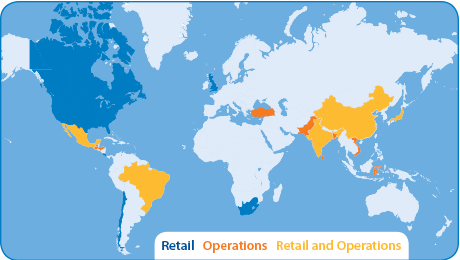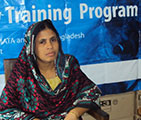Compliance & Sourcing
Focused on respect
Respect is a core value at Walmart. This includes respect for the men and women who make the products we sell. We expect the men and women in our supply chain to be provided with a safe and healthy working environment and to be treated with dignity.
Responsible Sourcing has become part of Walmart’s 14-point Global Compliance Program, serving as the bridge between our internal compliance efforts and our global supply chain. As a key area of compliance, Responsible Sourcing sets policy and monitors compliance and remediation activities of suppliers and factories in our global supply chain for:
- Anti-corruption
- Anti-money laundering
- Environment
- Health and safety
- Labor and employment
- Licenses and permits
Responsible Sourcing staff locations

“World Vision has been honored to work with the Walmart Foundation, an organization with strong dedication to investing in innovative initiatives that have global impact. Our organizations share a common goal of helping people to live better and to provide a better life for their families. In Central America, through our collaboration in this historic Global Women’s Economic Empowerment (WEE) initiative, our shared goal is achieved when we hear heartfelt stories from women whose health and well-being have been absolutely transformed through their participation in the WEE program. WEE is positively affecting both their work and family engagements. The factory owners and managers also report a more productive workforce that is improving their businesses. As such, we have witnessed first-hand the significance that our strong organizational collaboration has on driving meaningful change for many thousands of women and their communities around the world.”
– Cheryl Ennis Self, executive director, Global Social Partnership, World Vision
As part of the Global Compliance organization, we’re reinforcing the fact that responsible sourcing throughout our supply chain is embedded in the Walmart way of working and core to our business.
We also continue to positively influence the global supply chain, by raising standards and by working with other brands, retailers and stakeholders to improve the working conditions in the countries from which we source. In 2013, we made important enhancements to our Responsible Sourcing program in three key areas:
- Empowerment: Empowering workers, suppliers, factories and our own merchants through training, capacity-building programs and ongoing support.
- Worker safety and well-being: Focusing on worker safety and well-being in our supply chain by verifying compliance with our standards through continued social and safety audits; strengthening labor and environmental practices in farms and factories that supply us with merchandise; and proactively collaborating with other brands, retailers, governments and key stakeholders.
- Transparent supply chain: Promoting transparency in our supply chain by releasing the results of our in-depth factory assessments in Bangladesh and working with industry and stakeholder partners to share best practices and collaborate on sustainable solutions to challenges facing the global supply chain.
As we continue to grow our Responsible Sourcing program, we are expanding our international responsible sourcing team. Currently, we have more than 140 Responsible Sourcing associates working in our market and sourcing offices around the globe.

BSA Group Factory, Chittagong, Bangladesh
Rahima was born in a village in Southwest Bangladesh. Because she married young, she wasn’t able to finish her education. Nineteen years ago, Rahima left her marriage and took her son and daughter to Chittagong to find work. For the past 11 years, she’s worked at BSA Group Factory.
In 2013, Rahima participated in the Women in Factories training program funded by the Walmart Foundation and was then nominated by her factory management to participate in the advanced training course, as well as a four-month functional literacy program.
Following the advanced training, Rahima’s worklife has improved. Her supervisor appreciates her problem-solving attitude and counts on her to accurately count the production pieces. Rahima said, “I’m grateful for the [Women’s] Economic Empowerment program. It supports and empowers us.”
